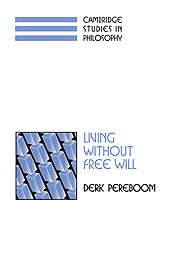Book contents
- Frontmatter
- Contents
- Acknowledgments
- Introduction: Hard incompatibilism
- 1 Alternative possibilities and causal histories
- 2 Coherence objections to libertarianism
- 3 Empirical objections to agent-causal libertarianism
- 4 Problems for compatibilism
- 5 The contours of hard incompatibilism
- 6 Hard incompatibilism and criminal behavior
- 7 Hard incompatibilism and meaning in life
- Bibliography
- Index
3 - Empirical objections to agent-causal libertarianism
Published online by Cambridge University Press: 23 July 2009
- Frontmatter
- Contents
- Acknowledgments
- Introduction: Hard incompatibilism
- 1 Alternative possibilities and causal histories
- 2 Coherence objections to libertarianism
- 3 Empirical objections to agent-causal libertarianism
- 4 Problems for compatibilism
- 5 The contours of hard incompatibilism
- 6 Hard incompatibilism and criminal behavior
- 7 Hard incompatibilism and meaning in life
- Bibliography
- Index
Summary
INTRODUCTION
The most significant empirical objections to agent-causal libertarianism challenge its capacity to accommodate our best natural scientific theories. Different aspects of this type of libertarianism give rise to two such objections. First, given our scientific understanding of the world, how could there exist anything as fabulous as an agent-causal power? It would appear that our natural scientific theories could not yield an account of a power of this sort. Second, given our scientific understanding, how could there be agent-caused decisions that are freely willed in the sense required for moral responsibility? Such decisions, it would seem, would not be constrained by the laws of nature, and therefore could not exist in the natural world.
Let us begin with the first of these two issues. Some libertarians maintain that there could be no natural scientific account of agentcausal powers. But they do not conclude from this that such powers do not exist, only that they could not be wholly physically realized. For others, a more congenial approach is to avoid non-physicalism by exploiting the resources of nonreductive materialism. According to nonreductive materialism generally construed, causal powers in the purview of sciences such as biology and psychology arise solely as a result of the organization of their material constituents, while they do not reduce to microphysical causal powers.
- Type
- Chapter
- Information
- Living without Free Will , pp. 69 - 88Publisher: Cambridge University PressPrint publication year: 2001



